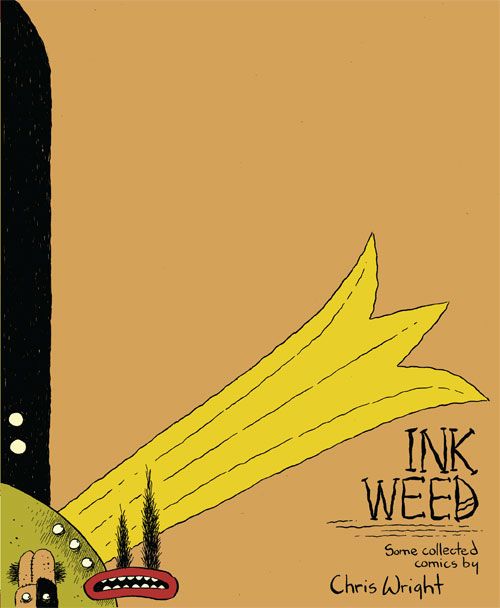I really like Chris Wright's art style. I like his not quite-abstract, not-quite cubist characters, and the way they're knocked down to basic geometric shapes that intersect at odd and slightly uncomfortable angles. I like the way his line squiggles, harking back to classic strip artists like E.C. Segar while at the same time suggesting a nervious, barely containable energy. I like that his dialogue frequently sounds as though it walked out of the second act of an Ibsen play to knock back a few at the pub across the street. I like that he frequently goes crazy with the cross-hatching.
So I suppose it's no real surprise that I found a lot to like about Inkweed, a collection of short stories published by Sparkplug Press and I believe Wright's first book of any sort to date (up till now he's only put in appearances in various anthologies).
Age, the loss of one's talent, desire, love, sex and the inability to get anywhere with members of the opposite sex are the pervading themes in these stories. An acclaimed painter stares into the abyss. An aging astronomer longs for his comely assistant. An author, newly besotted with a woman half his age, attempts to reconcile with his disaster of a son, with horribly tragic consequences. And, in my favorite tale, a water demon longs for his son's wife, only to meet a sad fate.
Obviously, in addition to whatever romantic chip Wright may have on his shoulder, there's more than a bit of the romantic in him. The notion of the writer against the world, of being in thrall to creativity but adrift in the "real world" of relationships and honest emotions seems to hold deep resonance for him. This sort of thing could quickly become insufferable were it not for Wright's own self-deprecating humor (he reminds me of Walt Holcombe in that respect) and his afore-mentioned art. I especially liked how, as the book progressed, his layouts became more adventures until they seemed as knotted and and ornate as the characters laid upon the page.
I'm not quite sure why this book didn't get more attention last year. Perhaps it got lost amidst a sea of other books. Perhaps Sparkplug simply didn't have the marketing muscle to get it out into more hands. Perhaps folks were turned off by either the author's "suffering artist" themes or his odd looking cast.
I hope it's not the latter. Wright has developed an utterly unique and idiosyncratic style, one that deserves encouragement and praise. I plan on buying his next book.


